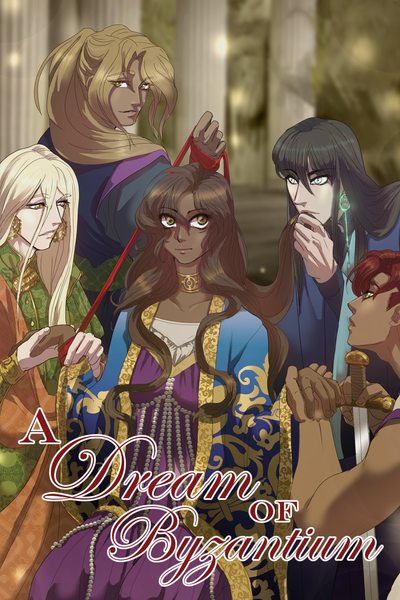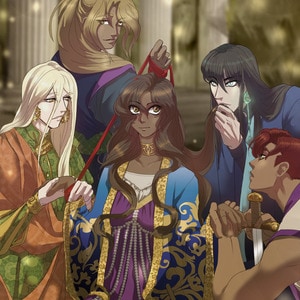When night had fallen and she was tasked to bring the two men dinner, she didn’t bother acting coyly. “I thought you’d be gone by now.”
“There’s no point running into closed doors,” Aristides said, gratefully accepting his plate. “The watchmen are not letting anyone out of the city for now, and all the usual exits are being monitored. Only the fish can get out.”
“Are you going to stay here until you can leave?”
“It makes no difference,” Phobos replied, resigned. “Even if we wanted to move around, it will only take them a single look at their gate records to start looking for two Phrygian men who are suspiciously alive.”
“And then…?”
“We’ll have to argue our innocence in court.”
“You need an alibi…” Ophelia murmured, the last word coming out in her native English. Aristides frowned, and asked for clarification. “It’s something that proves you were somewhere else at the time of the crime.”
“Is this something you do often in Londinium? Helping criminals avoid their punishment?”
Ophelia blushed. “Not really, but I have seen enough movies to get an idea. Uhm,” she clarified, noticing again she had thrown a foreign concept at them. “Movies are kind of like plays that you are able to watch whenever you want.”
“And what did people do in these… moo-vees for an ah-lee-bye?” Aristides asked slowly, trying to get through the foreign pronunciation.
“Well, they’d get someone else to claim they were with them when the crime happened, for example. Like a wife; to defend her husband, she’d claim that he spent the night with her.”
That seemed to brighten up the old warrior, who gently turned around to Phobos with a pleased smile on his face. “The gate records! What a fantastic idea, princess!”
The prince’s scowl appeared in full force. “What are you talking about, old man?”
“The gatekeepers must have recorded her entrance as well, and as your wife! Perhaps, she can make this ah-lee-bye for you. We should hide your sword. We can claim you were in the midst of your moon night.”
“Moon night?” Ophelia asked.
“In our country, certain marriages are only valid if the groom and the bride do certain things on the first night together,” Aristides explained. “They must consummate their marriage, and keep vigil during the night to make sure the spirits of their ancestors don’t appear to bestow them with bad luck. They also require a chaperone, which is what I will be playing.”
She was more than happy to go with the lie, yet the blush still came onto her cheeks. She wasn’t alone; Phobos didn’t seem to share his mentor’s enthusiasm.
“They will think she’s my wife after that; and once we go, what about her honour?”
“They are Iberians, my prince! They see their women in a different way. For them it is more natural that the men will wander and the women will seek other men.”
Phobos wasn’t convinced. He locked eyes with Ophelia. “We’ll find some other way.”
“It’s fine, I don’t mind lying.”
“But your honour…!”
“I haven’t had a boyfriend in twenty-seven years, I don’t think I’ll have one any time soon. My honour has never been an issue.”
The two of them stared at her, mouths open. Everything about their impending capture and trial had been forgotten for a moment.
“You’re twenty-seven?” Aristides exclaimed. “You’re older than Phobos!”
Ophelia regarded the prince with a confused stare, looking him up and down. He certainly seemed to be her age. “I’m twenty-two years of age,” he confessed. “Why are you so fresh-looking?”
Aristides quipped in. “Is this how people age in Byzantium?”
“What you eat and how you live make a difference, I imagine. Life at home is very different from this.”
The older warrior seemed fascinated by it, and was ready to keep interrogating her. Downstairs, however, tavern work had piled up. Ophelia heard her name being shouted from the backyard and knew it was time to get back to help Felicia. She bid the two men goodbye, promised they would talk later, and slipped downstairs.
She was forced into an early start on the following day. Lucio was supposed to cover some of the preparations for breakfast to give her a bit more time to sleep, as she’d ended up getting into bed quite late due to all the cleaning and washing up that had been left to do the previous night. The banging and shouting from the city watchmen, however, soon made her lie-in impossible.
“We are looking for two Phrygian men named Golgotas and Demora,” said one of the men. “We have been told they’re staying here.”
“What is this about? Are you rounding up all Phrygians in the city?” Felicia, still in her under tunic, was scowling at the group.
“They entered the city with the men who were murdered. We simply want to take them to the magistrate to help clarify what happened.”
Ophelia silently moved towards the landing of the stairs, so that it would seem like she’d come from Phobos’ and Aristides’ room. “Felicia,” she said with affectation, faking a wide yawn, “can I grab some milk from the… oh, apologies, I didn’t know you were with customers.”
If the inn-keeper found anything strange about her actions, it didn’t show. Instead, she explained, “they’re watchmen. They’re looking for clues on the Phrygians’ murders.”
“Ah yes, the men we travelled with,” Ophelia walked closer to the group, hugging herself as if to make up for the lack of warmth after leaving her bed. “We were all staying here, but we had our own business, and they had theirs. My husband and I… we spent our first moon night yesterday, you see, so the whole day before was spent preparing for it. It’s been quite strange, to be honest. One of the men was murdered the day before the rest of them, another went missing… They seemed to be bad news.”
“You are the woman they came into the city with, correct?” Ophelia nodded. “Why didn’t you come forward to the magistrates?”
Ophelia looked at Felicia, pretending to be confused. “Do Iberians not celebrate their wedding? I was with my husband, observing our rites as newlyweds, in the Phrygian fashion.”
The men murmured, but their leader seemed to be unconvinced.
“So you were here the last two days?”
“Correct.”
“I can vouch for that,” Felicia replied. “They eloped and were hoping to make some money to make their way towards Hibernia.”
“Where is your husband now?”
“I’m here,” Phobos and Aristides made a timely entrance, both clearly having made it out of bed moments before. The sight was surprising and made Ophelia think it should be illegal; Phobos’ auburn hair had been hastily arranged, his green eyes still heavy with the weight of a good night’s sleep, and his bare torso seemed more at ease in an underwear advertisement than as a real thing to be looked at in real life. She tried to look away, and respect the other’s modesty, but she couldn’t stop the blush from creeping onto her cheeks.
“I’m Demora, and this is my foster-father Golgotas,” Phobos said with a scowl. “Why are you inconveniencing my wife?”
The prince stood next to her, wrapping his arm around her in a protective gesture. Ophelia tried to remember the grave situation at hand, but found it difficult: it was not every day she was in close contact with a man so handsome, and it was understandably something she wasn’t prepared to deal with. It all worked in their favour, however, as her bashfulness helped to support their lies in the eyes of the watchmen.
“The three of you ought to come with us to the magistrate. You’re suspected of having murdered the Phrygian men you travelled with.”
Aristides argued, “I wonder what kind of aurelian miracle you think we’re capable of; a man and his chaperone observing his first moon and sneaking out to murder ten men.”
“You can make your case to the magistrate, wise man. Now make yourselves presentable and hand over your weapons.”
Phobos seemed ready to argue but stopped when his old teacher put a hand on his arm and shook his head ever so slightly. Aristides turned then to Ophelia, and motioning to Felicia to listen in, he said, “put on your Hibernian attire, my lady, so that the magistrate understands the nature of those he’s dealing with.”
“It should be dry by now, my lady,” Felicia continued the game. “You can go upstairs to get changed, I’ll bring it to you.”
Ophelia understood immediately they were referring to her modern, Byzantine clothes. She followed Phobos to the room he shared now only with his teacher. The two men readied their clothes while she sat on one of the empty beds, with her back to them.
“What we’ll tell them,” Aristides whispered as they clothed themselves, “is that you’re a high-born, yet a little eccentric, hibernian princess who eloped with a Phrygian mercenary after being kidnapped for ransom. I’m the chaperone who’s travelled with you to the port to bear witness to your marriage. You came here hoping to make some money to travel back to Hibernia.”
The older warrior’s eyes strayed towards the spear Ilmarinen had left, which was resting innocently against the wall. “We’ve put away our swords. We can give them the seaxes and the spear and claim those are our only weapons; since they’ve seen the sword cuts on their bodies, we’ll have another argument to rest on.”
Felicia brought Ophelia’s clothes, all neatly bundled together. “They’re all quite restless downstairs. They’ve got more watchmen outside of the building; it’d be impossible to try and slip by.”
“We’ll argue our innocence at court,” Phobos said as he looked outside the window.
“You’ll be a sacrificial lamb, I’m afraid. The magistrates will love that this is a Phrygian issue; they only need to wait until the envoys get here and they will hand you over to them.”
“Yes, but this is not merely a Phrygian matter anymore, is it?” Aristides pointed towards the clothes Ophelia was holding. “They will have some memory of the last Hibernian raid. That’ll be enough to give us some wriggle room.”
Felicia bit her lip and slowly nodded. “Princess,” Aristides said turning to Ophelia, “the Hibernians are known as savage, war-like people who hold grudges for long. They’ve attacked this port before, burnt it to the ground. The magistrate will likely not try to tempt fate.”
Ophelia nodded, growing more anxious by the minute. She just hoped they would be able to pull it off. Felicia took her then to the neighbouring room. As she changed from the simple linen dress and apron she’d grown used to in the previous days, a strange feeling overcame her. It was as if her skin had forgot the embrace of the synthetic fabrics; zippers and plastic buttons looked foreign, capricious inserts of someone else’s imagination into what was otherwise a familiar shape. Each detail that she’d never paid mind to suddenly turned into an ugly highlight. The perfection of the machine stitching, the elaborate cuts and shaping of the garments were reminders of a time and place she was glad to leave behind.
As budding as her relationship to that strange world was, she had felt embraced by it; she had met people she was comfortable with, had been given a role to play. To be reminded in such a physical way that she was from elsewhere was almost insulting; she felt afraid of perhaps, by donning her modern clothes, of calling forth the world she’d left behind.
She’d take the risk, however, because she wanted to help. She couldn’t quite call Phobos and Aristides her friends, but she felt compassion towards their situation, and was grateful that they hadn’t left her stranded in the wilderness to fend for herself.
The three of them made their way downstairs, and were promptly escorted out and into the busy Caudicean streets. The presence of the watchmen had garnered the attention of the populace and as they walked to the central forum they were pelted with the curious stares of men, women and children who had stopped their day’s labours to take a look at the proceedings. Some of them shouted expletives towards them; it was clear that in the court of public opinion certain matters had been resolved the moment someone had been singled out by the magistrate. The ironic thing about the situation is that they were right, and the object of their tirades was guilty of what he was accused off, but there was no proof they could see other than the elaborate drawings on their skin, which linked them to the victims.











Comments (0)
See all